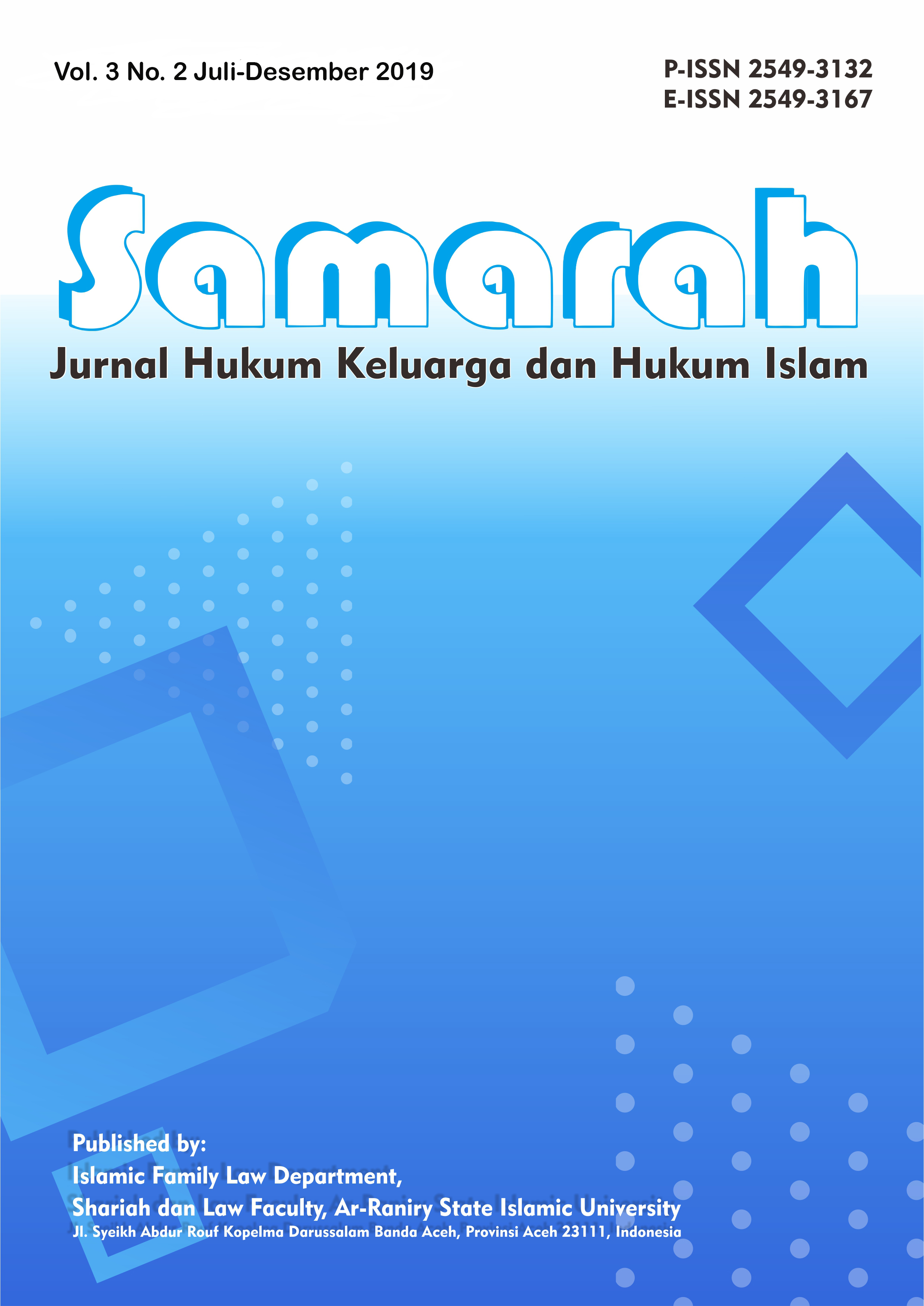Tinjauan Hukum Islam tentang Pembebanan Mut’ah dan Nafkah Iddah terhadap Suami yang Murtad (Studi Kasus Putusan Pengadilan Agama Nganjuk No: 1830/Pdt.G/2016/PA.Ngj) [Review of Islamic Law on The Imposition of Mut'ah and Living Iddah against Apostate Husbands (Case Study of Nganjuk Religious Court Decision No: 1830/Pdt.G/2016/PA. Ngj)]
DOI:
https://doi.org/10.22373/sjhk.v3i2.5242Keywords:
Islamic Law, Mut'ah, Nafd Iddah, ApostasyAbstract
When obligations do not work in a balanced manner in fostering a household, disputes and arguments often occurs which will result in the termination of a marriage. Divorce can occur by various factors in a marriage. One of the factors that divorce causesare one among apostate husbands or wives, which if the marriage continues to be maintained will cause loss. As a result of the divorce because the husband has lapsed into marriage, the marriage is immediately finished, and if the marriage is fulfilled, a wife will not get mut'ah and a living from her husband, but it is different from being practiced in a religious court whose husband is burdened with giving mut ' ah and livelihood iddah. So with the existence of these problems the author will review the judges' considerations in considering their decisions and reviewing Islamic law. This study aims to find out about the definition of Mut'ah, the livelihood of iddah and apostasy, to find out the legal basis used by the judge in deciding cases and what according to the views viewed from Islamic law.To answer these three problems, the researcher used a qualitative approach with field research that collected data directly from the source. In qualitative research, the researcher is faced directly with the respondent, namely a direct interview by the Judge in the Nganjuk Religious Court.Based on the research, even though the husband apostatized and married the husband was still obliged to give mut'ah and livelihood because even though the apostate's husband would not obstruct the husband's obligation to his wife, and the divorce divorce case was equated with ordinary divorce divorce. Judges use the basis of article 149, 117, with reasons for divorce article 116 letter (f) and (h) KHI (Compilation of Islamic Law) and the results of RAKERNAS MARI in 2005. and viewed from a review of Islamic law judges use volcanic jurisprudence II if the termination of marriage because of apostasy does not require a court decision or judge's decision and is immediately canceled and does not see the consequences of the apostasy.
References
Az-Zuhaili Wahbah. 2011. Fiqih Islam Wa Adillatuhu.Jilid 9(Jakarta:Gema Insani).
Syarifuddin Amir. 2006. hukum perkawinan islam di indonesia (Jakarta: Kencana. ).
Sabiq Sayyid. 2011. Fikih Sunnah. Jilid 3. (Jakarta: Cakrawala Publishing).
Muhammad Zuhaily. 2010. Fiqih Munakahat. (Diterjemahkan Oleh:Al-Mu’tamad Fi Al-Fiqh As-Syafi’i).
Undang-Undang RI Nomor 1 Tahun 1974 tentang Perkawinan,
Ghozali Abdul Rahman. 2003. Fiqh Munakahat. (Jakarta:Prenadamedia Group).
Kompilasi Hukum Islam (KHI). Permata press terbaru.
Azzam, Abdul Aziz Muhammad. 2009. Fiqih Munakahat. (Jakarta:Amzah.)
Syarifuddin Amir. 2003. Garis-Garis Besar Fiqh. Cet ke 2. (Jakarata: Kencana).
Basyir, Ahmad Azhar. 2000. Hukum Perkawinan Islam. (Yogyakarta: UII Press.)
Tihami dan Sohari Sahrani, Fikih Munakahat, (Jakarta:Rajawali Pers, 2010
Mannan Abdul. Fiqih Lintas Madhzab. Juz 5
Daly Peunoh. 2005. Hukum Perkawinan Islam.Cet ke-2. (Jakarta: PT. Bulan Bintang.).
Ahda Bina Afianto. 2010 Akibat Hukum Murtadnya Suami Terhadap Status
Pernikahan Dan Anak,Ulumuddin, Volume VI,Tahun IV, Januari
Shidiq Saipudin. 2016. Fikih Kontemporer. (Jakarta: Prenademedia Group)
Saebani, Ahmad Beni. 2010. Fiqh Munakahat 2. (Bandung: CV Pustaka Setia)
Tihami dan Sohari Sahrani. 2010. Fikih Munakahat. (Jakarta: Rajawali Pers)

Downloads
Published
Issue
Section
License
Authors who publish in Samarah: Jurnal Hukum Keluarga dan Hukum Islam agree to the following terms:
- Authors retain copyright and grant the journal right of first publication with the work simultaneously licensed Attribution-ShareAlike 4.0 International (CC BY-SA 4.0) that allows others to share the work with an acknowledgment of the work's authorship and initial publication in this journal.
- Authors are able to enter into separate, additional contractual arrangements for the non-exclusive distribution of the journal's published version of the work (e.g., post it to an institutional repository or publish it in a book), with an acknowledgment of its initial publication in this journal.
- Authors are permitted and encouraged to post their work online (e.g., in institutional repositories or on their website) prior to and during the submission process, as it can lead to productive exchanges, as well as earlier and greater citation of published work. (See The Effect of Open Acces)









